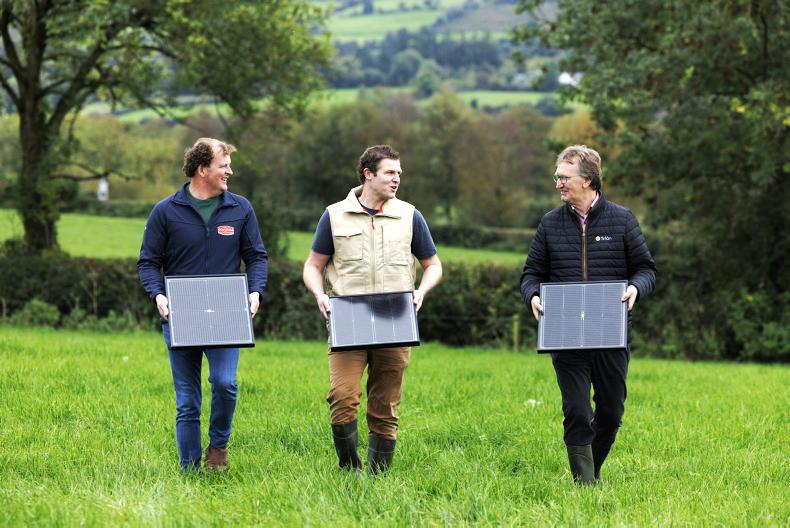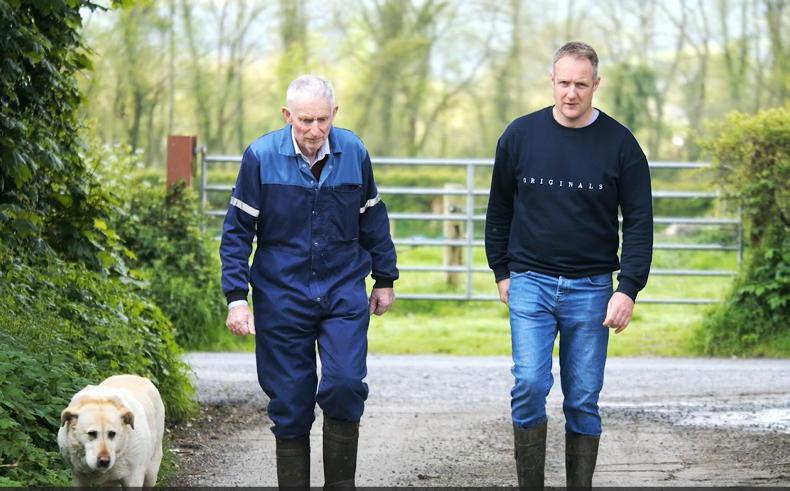Co-ops Tirlán and Dairygold have joined forces in a bid to expand on-farm solar and reduce the cost of energy-intensive processes on their suppliers’ dairy farms.
In 2019, Tirlán first launched the FarmGen Solar PV programme and since then it has seen over 300 farmers embrace a range of turnkey solar-powered FarmGen systems on their farms.
The FarmGen programme is now extended to Dairygold dairy farmers, making sustainable technologies available to even more family farms around the country.
FarmGen systems power energy intense processes such as milk cooling, vacuum pumps and water heating on the farm, as well as delivering energy savings of typically between 20% and 50% per annum.
Dairygold and Tirlán milk suppliers can avail of 100% flexible and competitively priced financing for the FarmGen installation on their farm.
Farmers can now also avail of TAMS III funding at a rate of 60%, which Tirlán’s Damien Sutton described as a welcome development for the installation of solar on farms.
The grant is also leading to larger systems being installed on dairy farms while, at the same time, bringing payback down to between two and a half to four years, Sutton added.
Smart monitoring
The solar-powered bundle is available through the programme’s technical partner, PV Generation. It will supply and install state-of-the-art solar PV systems, along with smart monitoring on farms.
As part of this solution, FarmGen will manage the Government’s TAMS and SEAI grant application processes and submission for competitively priced financing, if required, making it an even more attractive investment.
We have a long history of showing industry leadership and working together to innovate and deliver solutions for our communities
Speaking at the launch of the new collaboration, Tirlán chair John Murphy said: “Farm families work with nature and are keen to embrace renewable energy on farm.
“The new collaboration is a clear indication of the importance Tirlán places on continuously innovating to meet our living proof sustainability targets and is in line with the Government’s commitment to reducing carbon emissions.
“As co-operatives, we have a long history of showing industry leadership and working together to innovate and deliver solutions for our communities.
“We look forward to working together to continue to bring the latest renewable energy technologies to the farming community to enhance the environmental and economic sustainability of family farms.”
Dairygold chair Sean O'Brien; dairy farmer David Russel, Ballyporeen, Tipperary and Tirlán chair John Murphy.
Beneficial
Dairygold chair Seán O’Brien said that this collaboration demonstrates how beneficial it can be when industry leaders come together to achieve a common goal.
“By partnering with Tirlán, we’re extending the geographical reach of this turnkey solution and making it possible for more farmers to adopt renewable energy on their farms in a manner that is efficient for all involved.
“The FarmGen programme is yet another positive step in the right direction in our efforts to reduce on-farm emissions and contribute to a more sustainable dairy sector,” he said.
Case study: Laois dairy farmers

John and Rory McEvoy from Co Laois installed 50 solar panels on their shed roof last year.
Father-and-son duo John and Rory McEvoy in Co Laois installed a 20kw system on their farm in 2022.
Some 34% of their farm’s energy demand comes from the solar PV system and since installation, 6,000kw of green energy has been fed back to the national grid. However, the McEvoys do not get any money from this.
“We put up 50 solar panels on the roof of the shed and it cost us €38,000. We paid it straight up last year because we had such a good year with milk price – we were going to be paying it in tax either way.
“They were the only investment I’ve made on the farm that I haven’t had to do any extra work with. They just do their little job and work away themselves.
“There was no real work involved, the shed was facing south so it was ideal. The only thing we had to do was cover the sky lights with another sheet because they wouldn’t be strong enough without it.
“At the minute, the excess is going back to the grid because we can’t store it but, unfortunately, we’re not getting any money for that so we’re considering putting in batteries in order to store the electricity that’s produced.
We’re very happy we bought them and we’d definitely recommend them to other dairy farmers
“We’re also considering buying an electric quad and a cubicle scraper which you could just leave plugged in. They’re great, the panels. They produce electricity even when it’s not a very sunny day.
“We’re very happy we bought them and we’d definitely recommend them to other dairy farmers,” John McEvoy said.
John said that, currently, there are too few farmers generating electricity to be able to get a proper price for what they are producing.
“Now that Dairygold and Tirlán are joined up on this venture, we could get 2,000 or 3,000 farmers set up and have a better chance of being paid for any extra that we produce.
“As individuals we’ve no power going to the ESB by ourselves,” he maintained.
Co-ops Tirlán and Dairygold have joined forces in a bid to expand on-farm solar and reduce the cost of energy-intensive processes on their suppliers’ dairy farms.
In 2019, Tirlán first launched the FarmGen Solar PV programme and since then it has seen over 300 farmers embrace a range of turnkey solar-powered FarmGen systems on their farms.
The FarmGen programme is now extended to Dairygold dairy farmers, making sustainable technologies available to even more family farms around the country.
FarmGen systems power energy intense processes such as milk cooling, vacuum pumps and water heating on the farm, as well as delivering energy savings of typically between 20% and 50% per annum.
Dairygold and Tirlán milk suppliers can avail of 100% flexible and competitively priced financing for the FarmGen installation on their farm.
Farmers can now also avail of TAMS III funding at a rate of 60%, which Tirlán’s Damien Sutton described as a welcome development for the installation of solar on farms.
The grant is also leading to larger systems being installed on dairy farms while, at the same time, bringing payback down to between two and a half to four years, Sutton added.
Smart monitoring
The solar-powered bundle is available through the programme’s technical partner, PV Generation. It will supply and install state-of-the-art solar PV systems, along with smart monitoring on farms.
As part of this solution, FarmGen will manage the Government’s TAMS and SEAI grant application processes and submission for competitively priced financing, if required, making it an even more attractive investment.
We have a long history of showing industry leadership and working together to innovate and deliver solutions for our communities
Speaking at the launch of the new collaboration, Tirlán chair John Murphy said: “Farm families work with nature and are keen to embrace renewable energy on farm.
“The new collaboration is a clear indication of the importance Tirlán places on continuously innovating to meet our living proof sustainability targets and is in line with the Government’s commitment to reducing carbon emissions.
“As co-operatives, we have a long history of showing industry leadership and working together to innovate and deliver solutions for our communities.
“We look forward to working together to continue to bring the latest renewable energy technologies to the farming community to enhance the environmental and economic sustainability of family farms.”
Dairygold chair Sean O'Brien; dairy farmer David Russel, Ballyporeen, Tipperary and Tirlán chair John Murphy.
Beneficial
Dairygold chair Seán O’Brien said that this collaboration demonstrates how beneficial it can be when industry leaders come together to achieve a common goal.
“By partnering with Tirlán, we’re extending the geographical reach of this turnkey solution and making it possible for more farmers to adopt renewable energy on their farms in a manner that is efficient for all involved.
“The FarmGen programme is yet another positive step in the right direction in our efforts to reduce on-farm emissions and contribute to a more sustainable dairy sector,” he said.
Case study: Laois dairy farmers

John and Rory McEvoy from Co Laois installed 50 solar panels on their shed roof last year.
Father-and-son duo John and Rory McEvoy in Co Laois installed a 20kw system on their farm in 2022.
Some 34% of their farm’s energy demand comes from the solar PV system and since installation, 6,000kw of green energy has been fed back to the national grid. However, the McEvoys do not get any money from this.
“We put up 50 solar panels on the roof of the shed and it cost us €38,000. We paid it straight up last year because we had such a good year with milk price – we were going to be paying it in tax either way.
“They were the only investment I’ve made on the farm that I haven’t had to do any extra work with. They just do their little job and work away themselves.
“There was no real work involved, the shed was facing south so it was ideal. The only thing we had to do was cover the sky lights with another sheet because they wouldn’t be strong enough without it.
“At the minute, the excess is going back to the grid because we can’t store it but, unfortunately, we’re not getting any money for that so we’re considering putting in batteries in order to store the electricity that’s produced.
We’re very happy we bought them and we’d definitely recommend them to other dairy farmers
“We’re also considering buying an electric quad and a cubicle scraper which you could just leave plugged in. They’re great, the panels. They produce electricity even when it’s not a very sunny day.
“We’re very happy we bought them and we’d definitely recommend them to other dairy farmers,” John McEvoy said.
John said that, currently, there are too few farmers generating electricity to be able to get a proper price for what they are producing.
“Now that Dairygold and Tirlán are joined up on this venture, we could get 2,000 or 3,000 farmers set up and have a better chance of being paid for any extra that we produce.
“As individuals we’ve no power going to the ESB by ourselves,” he maintained.








 This is a subscriber-only article
This is a subscriber-only article











SHARING OPTIONS: